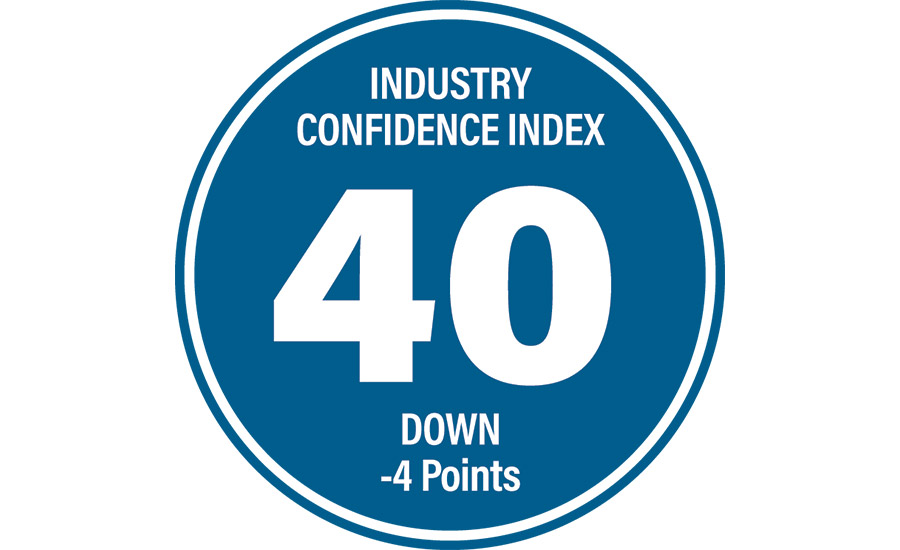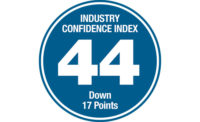ENR’s Construction Industry Confidence Index fell four points this quarter, to a rating of 40. Confidence in the current construction market is virtually unchanged, but execs have become more pessimistic about the short- and medium-term future. About 40.1% see a declining market three to six months from now, up from 32.5% last quarter, and 33.3% see a decline 12-to-18 months from now, up from 21.4%.
The index measures executive sentiment about where the current market will be in the next three to six months and over a 12- to 18-month period, on a 0-100 scale. A rating above 50 shows a growing market. The measure is based on responses by U.S. executives of leading general contractors, subcontractors and design firms on ENR’s top lists to surveys sent between May 15 and June 26.
Confidence is higher among executives who reported between $50 million and $250 million in revenue (a 44 rating) than it is among those reporting less than $50 million (39) or more than $250 million (38).
Confidence in the economy as a whole is unchanged since last quarter, coming in at a 35 rating. Among index respondents, 49.6% see a shrinking economy in 3-6 months, up from 47.2% last quarter. However, the percentage of those who see the economy improving in that same time period also rose, to 10.3% from 8%.
CFOs See Darkening Clouds
The results of the latest Confindex survey from the Construction Financial Management Association (CFMA) are very clear, says Sage CEO and CFMA Advisor Anirban Basu—construction CFOs are pessimistic about the year ahead.
Each quarter, the group polls CFOs from general and civil contractors and subcontractors on markets and business conditions. The Confindex is based on four separate financial and market components, each rated on a scale of 1 to 200. A rating of 100 indicates a stable market; higher ratings indicate market growth.
All indices are down from last quarter and in comparison to their Q2 2022 readings. The overall Confindex fell 5.6% between Q1 2023 and Q2, to a rating of 101. The “business conditions” and “financial conditions” indices are down 2.9% and 6.4%, respectively.
“What construction financial professionals seem to be saying is that things are pretty good right now, but that there’s this expectation of grinding and weakness going forward,” explains Basu. The “current conditions” index of CFMA’s survey, while down 2.7%, still reports a relatively healthy 109 rating. Meanwhile the “year ahead outlook” index dropped 8%, to a 92 rating.
The Sage CEO sees the pessimism primarily in the developer-driven segment of the construction economy. He points to the recent failures of Silicon Valley Bank and Signature Bank, among other troubled financial institutions. “If you look at the Senior Loan Officer Opinion Survey, they’re saying that credit conditions have tightened, particularly for commercial real estate.” The percentage of respondents to ENR’s survey who listed their clients’ access to financing as “much tougher” than six months ago rose to 22.8% in Q2 from 16.1% in Q1.
Up and Down Markets
“You’ve got a very bad story coming out of commercial real estate—$1.5 trillion in commercial real estate related debt that has to be refinanced between now and the end of 2025—the so-called debt maturity wall,” says Basu. In many markets, vacancies are above 20%, he adds.
Pessimism over the near-term future of the construction industry is not universal. Leaving aside firms that expect money from the Infrastructure Investment and Jobs Act to hit harder in the second half of 2023 into 2024, Basu sees health care and housing as markets that will stay strong. “The single family housing market really surprised me,” opines the economist. “There are still bidding wars for houses despite these higher mortgage rates.”
Confidence is up at least four points in the multi-unit residential, transportation and industrial process markets among ENR survey respondents. The distribution/warehouses market jumped nine points to a 55 rating after six straight quarters of decline.
Basu singles out artificial intelligence-related construction as a possible boom market. “All these venture capital backed AI firms have yet to really get ready to get to market,” suggests Basu. He expects a frenzy of initial public offerings next year. “Then the demand for data repositories, computer processing, etc. … are going to vastly increase,” leading to a surge in mid-sized data centers.
Labor shortages continue to present problems, although executives say they have lessened short-term, with 27.5% reporting that staff shortages have eased either a little (22.4%) or a lot (5.1%). The equivalent number last year was only 7.3%.
Confindex respondents were asked to list challenges not specified in the survey. “I saw supply chain, technology, recession, turnover, war and work ethic,” says CFMA CEO Stuart Binstock. “You wonder how [executives] get up in the morning.”






Post a comment to this article
Report Abusive Comment